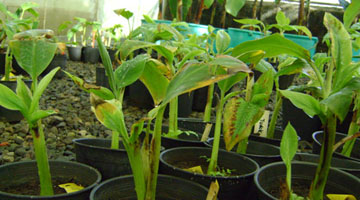 The Philippine Council for Agriculture, Aquatic and Natural Resources Research and Development (PCAARRD) teams up with the Institute of Plant Breeding-Crops Science Cluster (IPB-CSC) of the University of the Philippines Los Baños (UPLB) in a study to demonstrate the resistance of gamma-irradiated Lakatan mutant lines to banana bunchy top virus (BBTV).
The Philippine Council for Agriculture, Aquatic and Natural Resources Research and Development (PCAARRD) teams up with the Institute of Plant Breeding-Crops Science Cluster (IPB-CSC) of the University of the Philippines Los Baños (UPLB) in a study to demonstrate the resistance of gamma-irradiated Lakatan mutant lines to banana bunchy top virus (BBTV).
The new project, “Multi-location performance evaluation of a new BBTV-resistant Lakatan cultivar”, aims to make Lakatan banana production more profitable to small farmers by reducing losses due to BBTV by 20% through the adoption of disease resistant cultivar.
The P11.39-million project will test the performance of BBTV-resistant Lakatan in Quirino, Cavite, Laguna, Quezon, and Davao. It also will involve the Philippine Nuclear Research Institute, Quirino State College, Cavite State University, and Bureau of Plant Industry-Davao National Crop Research and Development Center.
BBTV is the most destructive virus of banana in the Philippines. It infects almost all banana cultivars and worse, no cure has been found yet.
For over five decades, BBTV has caused significant damage to the Philippine banana industry. It has been plaguing hectares of banana plantations in all parts of the country, greatly affecting the livelihood of many local growers.
The virus is carried and spread by banana aphids called Pentalonia nigronervosa. The infective aphids transmit the virus to a banana plant by feeding on it. Its virus infection causes stunting and leaf malformation leading to premature death, and ultimately, serious yield loss.
The most popular local banana cultivar, Lakatan, is among the cultivars affected by BBTV. Depending on the cultural management of the farmers, BBTV damage can cause as high as 75% yield loss per hectare. This high percentage costs the growers, especially the small hold poor farming families, their livelihood.
Recognizing this, PCAARRD supported an earlier study “Multi-location field evaluation and characterization of BBTV-resistant mutant lines”. The three-year project amounted to P 2.98 million.
Dr. Olivia P. Damasco and a team of researchers at the IPB evaluated the reaction of the 10 mutant line selections to the vector and virus. They artificially inoculated virus-carrying banana aphids in the said mutant lines to monitor insect preference.
Results showed that the resistance of Lakatan mutant lines to BBT disease could be attributed to the aphid’s non-preference to colonize and reproduce on certain banana lines.
Disease incidence was significantly higher on lines that were preferred by aphids and lower on those that were not colonized.
The reduced virus multiplication as indicated by low titer on mutant lines also implied a resistance response to the disease.
Additionally, researchers found that non-irradiated Lakatan banana had comparably high population of aphid, high disease incidence, and high virus titer.
The favorable response of irradiated Lakatan mutant lines against BBTV led to the approval of the upcoming project.
For more information about the project, please contact PCAARRD at (049) 536-0014 and CSC-UPLB at (049) 536-5790. You may also visit www.pcaarrd.dost.gov.ph for details.
